|
|
|
Sort Order |
|
|
|
Items / Page
|
|
|
|
|
|
|
| Srl | Item |
| 1 |
ID:
123702
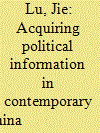

|
|
|
|
|
| Publication |
2013.
|
| Summary/Abstract |
Using complementary information from two national surveys conducted in 2008, i.e. the China Survey and the ABS II Mainland China Survey, this paper presents a comprehensive picture of the media channels that Chinese citizens use for political information, as well as their relative importance as assessed by the Chinese people. Moreover, assisted by multiple regressions, this paper also identifies which groups of Chinese are more likely to use each of these channels for political information. This paper contributes to our understanding on (1) the relative significance of various media channels in contemporary China's political communication; and (2) how Chinese citizens select themselves into specific channels for political information, given their increasing autonomy in acquiring such information from China's changing media.
|
|
|
|
|
|
|
|
|
|
|
|
|
|
|
|
| 2 |
ID:
066788
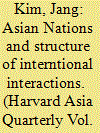

|
|
|
| 3 |
ID:
078648
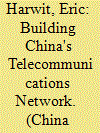

|
|
|
|
|
| Publication |
2007.
|
| Summary/Abstract |
This article uses theories of industrial policy to analyse the growth of China's telecommunications equipment industry over the past 20 years. It highlights the role of the Chinese government in shaping the sector, by first utilizing imported equipment, then promoting Sino-foreign joint ventures and finally fostering domestic companies. Significantly, the government encouraged market competition, and avoided the pitfall of monopoly state control. Today, key telecommunications players include joint ventures, state-owned companies and even a major Chinese private corporation. The article concludes that the government's fiscal and regulatory industrial polices were successful, in that they rapidly built a modern communications network while promoting a vibrant free-market competitive environment
|
|
|
|
|
|
|
|
|
|
|
|
|
|
|
|
| 4 |
ID:
110168
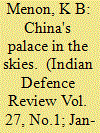

|
|
|
| 5 |
ID:
132108
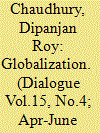

|
|
|
|
|
| Publication |
2014.
|
| Summary/Abstract |
Globalization is the process of international integration arising from the interchange of world views, product, ideas, and other aspect of culture. Advances in transportation and telecommunications infrastructure, including the rise of the telegraph and its posterity the internet, are major factors in globalization, generating further interdependence of economic and culture activities. Through scholars place the origins of globalization in modern times, other trace its history long before the European age of discovery and voyages to the new world. Some even trace the origins to the third millennium BCE. The term globalization has been increasingly used since the mid 1980s and especially since the mid 1990s.
|
|
|
|
|
|
|
|
|
|
|
|
|
|
|
|
| 6 |
ID:
061364
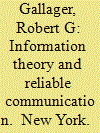

|
|
|
|
|
| Publication |
New York, John Wiley and Sons, Inc., 1968.
|
| Description |
xiv, 588p.
|
|
|
|
|
|
|
|
|
|
|
|
Copies: C:1/I:0,R:0,Q:0
Circulation
| Accession# | Call# | Current Location | Status | Policy | Location |
| 004237 | 003.54/GAL 004237 | Main | On Shelf | General | |
|
|
|
|
| 7 |
ID:
041386
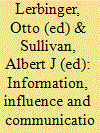

|
|
|
|
|
| Publication |
New York, Basic Books, 1965.
|
| Description |
xii, 513p.Hardbound
|
|
|
|
|
|
|
|
|
|
|
|
Copies: C:1/I:0,R:0,Q:0
Circulation
| Accession# | Call# | Current Location | Status | Policy | Location |
| 003587 | 384/LER 003587 | Main | On Shelf | General | |
|
|
|
|
| 8 |
ID:
002943
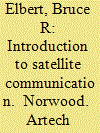

|
|
|
|
|
| Publication |
Norwood, ARTECH House, 1987.
|
| Description |
xvi,371p.:figures and tablesHbk
|
| Standard Number |
0890062293
|
|
|
|
|
|
|
|
|
|
|
|
Copies: C:1/I:0,R:0,Q:0
Circulation
| Accession# | Call# | Current Location | Status | Policy | Location |
| 030348 | 621.38/ELB 030348 | Main | On Shelf | General | |
|
|
|
|
| 9 |
ID:
047587
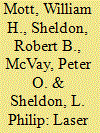

|
|
|
|
|
| Publication |
Westport, Quorum Books, 2000.
|
| Description |
x, 315p.Hbk
|
| Standard Number |
1567203299
|
|
|
|
|
|
|
|
|
|
|
|
Copies: C:1/I:0,R:0,Q:0
Circulation
| Accession# | Call# | Current Location | Status | Policy | Location |
| 043515 | 621.3827/MOT 043515 | Main | On Shelf | General | |
|
|
|
|
| 10 |
ID:
124029
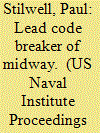

|
|
|
|
|
| Publication |
2012.
|
| Summary/Abstract |
An oral historian and former editor-in-chief of Naval History magazine takes us back seven decades, when U.S. Navy cryptanalysts had cracked the code of the enemy's radio traffic, resulting in one of the most decisive victories in military history.
|
|
|
|
|
|
|
|
|
|
|
|
|
|
|
|
| 11 |
ID:
079194
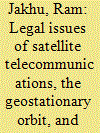

|
|
|
|
|
| Publication |
2007.
|
| Summary/Abstract |
Satellites are the best means for a rapid expansion of telecommunications services nationally and globally. However, the level of that expansion is greatly determined by the availability of the two indispensable tools for satellites, which are orbital positions and radio frequencies. Growing demand for geostationary orbital (GEO) slots and radio frequencies by a rapidly increasing number of commercial satellite operators and expanding dependence on satellites for military purposes give rise to shortage of slots and spectrum to allocate as well as an increase in satellite interference. Concurrently, increasing space activities and anti-satellite (ASAT) tests are generating man-made space pollution, particularly space debris, and consequently are making the use of outer space more expensive and dangerous. The problems shortage of appropriate orbital positions, satellite interference and space debris are serious. Unless resolved in a timely fashion, they would pose significant barriers and dangers to all (civilian, commercial and military) satellites and could result in denial of access to space in practice by all states. This paper first describes the current situation of shortage of GEO positions and increase in satellite interference. Secondly, current international regulatory regime governing the access to and use of these tools has been analyzed with a view to highlight the weaknesses therein. Thirdly, the problem of space debris is discussed with a view to show how difficult it is becoming to carry on space operations and how important and urgent it is to have an appropriate legal regime in place. Finally, a few recommendations are made emphasizing the need for international cooperation in order to strengthen the international regulatory regime so that the required telecommunication services remain readily available to all and outer space remain pollution-free environment to be used for and by all states.
|
|
|
|
|
|
|
|
|
|
|
|
|
|
|
|
| 12 |
ID:
187432


|
|
|
|
|
| Summary/Abstract |
The migration of Indians to Gulf countries can be traced back to the early twentieth century. With the discovery of oil in the region, Indian laborers began to migrate for a better livelihood, which also served as a valuable source of income for the country. Oil field workers who have migrated from India to the Gulf region are employed in oil rigs located in remote desert areas. They include both skilled as well as unskilled laborers and are employed in high-risk field-based jobs wherein family is not allowed. They work as international commuters and return home on a rotational basis at regular intervals. They constitute transnational families wherein most rely on telecommunication to connect with their family members in India and fulfill their social obligations. The economic, political, and sociocultural impact of migration has been studied by social scientists in substantial detail from the perspective of homeland as well as host land, but not much has been discussed about the experience of wives/spouses of oil field workers who are left behind at home even though their population is fairly large in India. Available data on the social and psychological impact of international migration suggest that such migration histories have both positive and negative impacts on transnational families. The COVID-19 pandemic, which affected the global scenario, did not spare them either. This article is a part of a meso-level study wherein a group of women residing in different parts of India was interviewed regarding their experience as wives of oil field workers in Gulf countries. Their husbands could not return home due to travel bans imposed by the Middle Eastern countries owing to the pandemic. This article attempts to look at significant issues pertaining to family and international migration to Gulf countries in the COVID times.
|
|
|
|
|
|
|
|
|
|
|
|
|
|
|
|
| 13 |
ID:
031170
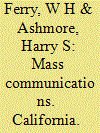

|
|
|
|
|
| Publication |
California, Center for the Study of Democratic Institutions, 1966.
|
| Description |
39p.
|
| Series |
An occasional paper in the role of mass media in the free society
|
|
|
|
|
|
|
|
|
|
|
|
Copies: C:1/I:0,R:0,Q:0
Circulation
| Accession# | Call# | Current Location | Status | Policy | Location |
| 006657 | 384/FER 006657 | Main | On Shelf | General | |
|
|
|
|
| 14 |
ID:
057305
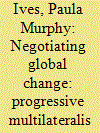

|
|
|
| 15 |
ID:
012868
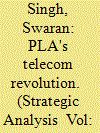

|
|
|
|
|
| Publication |
1997.
|
| Description |
1235-38
|
|
|
|
|
|
|
|
|
|
|
|
|
|
|
|
| 16 |
ID:
042428
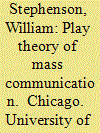

|
|
|
|
|
| Publication |
Chicago, University of Chicago Press, 1967.
|
| Description |
x, 225p.
|
|
|
|
|
|
|
|
|
|
|
|
Copies: C:1/I:0,R:0,Q:0
Circulation
| Accession# | Call# | Current Location | Status | Policy | Location |
| 004484 | 384/STE 004484 | Main | On Shelf | General | |
|
|
|
|
| 17 |
ID:
107708
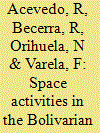

|
|
|
| 18 |
ID:
064353
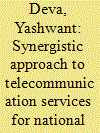

|
|
|
| 19 |
ID:
048983
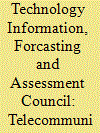

|
|
|
|
|
| Publication |
New Delhi, Department of science and technology, 1997.
|
| Description |
197p.Paperback
|
|
|
|
|
|
|
|
|
|
|
|
Copies: C:1/I:0,R:0,Q:0
Circulation
| Accession# | Call# | Current Location | Status | Policy | Location |
| 039819 | 384/TEC 039819 | Main | On Shelf | General | |
|
|
|
|
| 20 |
ID:
090095
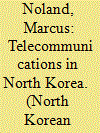

|
|
|
|
|
| Publication |
2009.
|
| Summary/Abstract |
The formation of telecommunications policy poses a difficult challenge for authoritarian regimes: while improvements in telecommunications can contribute to material prosperity, they may also contribute to a loss of control. North Korean policies reveal an ambivalent attitude, driven by conflicting goals of modernization and control. This paper reviews North Korea's telecommunications infrastructure and provides a brief history of North Korean telecommunications policies in a variety of settings, paying particular attention to the recent decision to authorize Orascom, a foreign cellular provider, to provide nationwide cellular service, potentially leapfrogging from North Korea's dilapidated existing systems to a modern system.
|
|
|
|
|
|
|
|
|
|
|
|
|
|
|
|
|
|
|
|
|